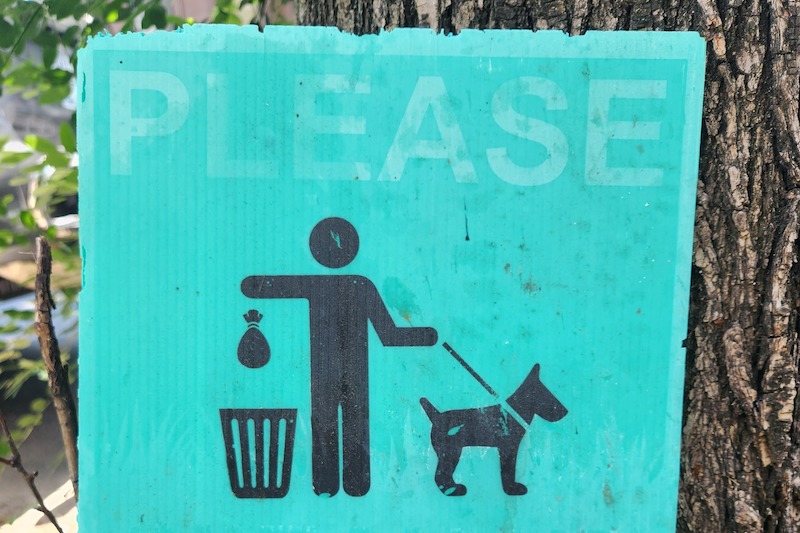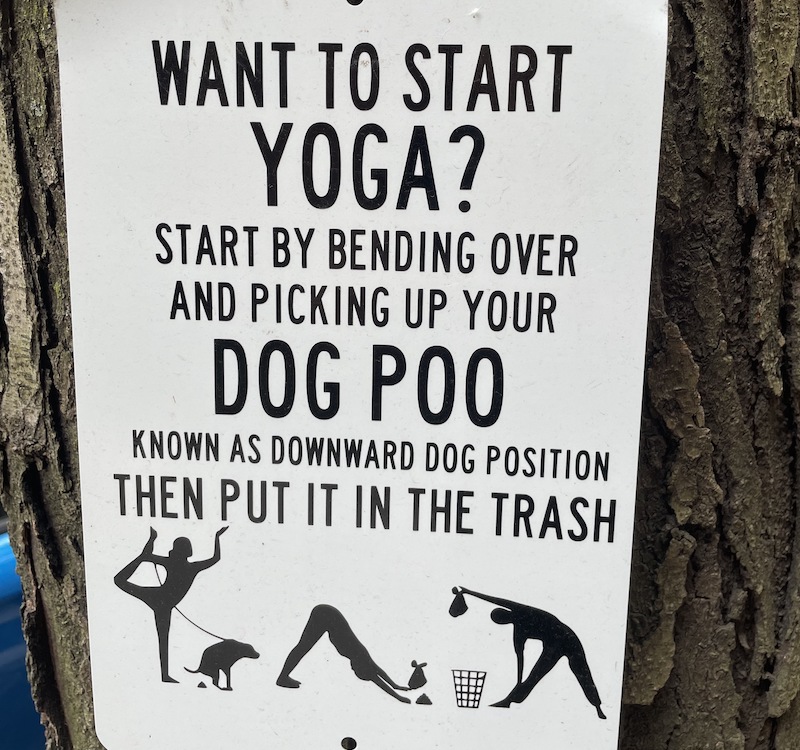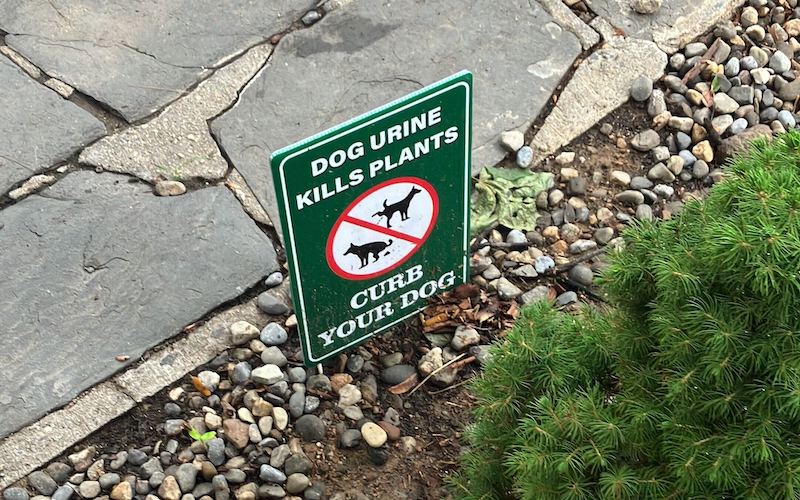How to Pick Up Your Dog's Poop Like a Pro
The scoop on pet waste best practices.

The scoop on pet waste best practices.

Picture this: You’re out for a leisurely stroll with your furry friend, minding your own business, when suddenly you step on an unexpected “doggy land mine.” There’s no quicker way to ruin your day (or your shoes).
It’s all too easy to turn a blind eye to your dog’s poop, claiming “well, everyone else is doing it.” (That might well be true in cities like Seattle, San Francisco, and Pittsburgh, ranked the Worst Cities for Dog Poop by the Dog Advisory Council).
But at Lemonade Pet we call on all pet parents to set a better example.
Read on to learn more about why it’s important to clean up after your pet, and some tips and tricks to make your life easier while doing it. Feel free to forward this article to that friend of yours who has a slightly lax attitude when it comes to their dog’s waste.
Picking up your dog’s poop is so much more than just a common courtesy. Here’s some more reasons to make a habit of safely disposing of your pup’s poop:

Cleaning up after your pooch is one of the shittier parts of pet parenthood. But with the right tools and know-how, doing your part for your neighborhood aesthetic and the environment will be a breeze.
Use a pooper scooper or biodegradable dog poop bags to pick up your pet’s waste.
A pooper scooper is a great tool if you’d prefer to keep a distance between your hands and the dog poop—like the Frisco Spring Action Foldable Dog Pooper Scooper. Pooper scoopers also make it easier to clean up after your dog if you’re on a hike or in your own yard.
Make sure to regularly sanitize and replace pooper scoopers, and keep them out of reach of children and other pets, to prevent the spread of harmful bacteria and pathogens that could pose health risks.
Biodegradable dog poop bags are designed to break down naturally in the environment over time. They’re typically made from plant-based materials—such as cornstarch or vegetable oils—which decompose faster, reducing landfill waste and the environmental impact of pet waste disposal. Some even come scented to mask the odor.
These doggy bags are usually available in a roll that conveniently fits in a small bag dispenser, which you can attach to your dog’s leash. Wirecutter tested a ton of bags so that you don’t have to—here are their top picks.
Here’s the best way to pick up dog poop using poop bags:
If your dog has softer stools or diarrhea, it’s more challenging, but not impossible. You can lay the plastic bag over the mess, push it gently into the bag, then gather up the edges and tie it off.
Carry a small bottle of disinfectant hand sanitizer, even though you won’t be directly touching your dog’s poop. Don’t forget that dog waste can contain harmful bacteria like E. coli and salmonella.
For maximum protection, wash your hands with soap and water as soon as you can.
When you go to pick up your dog’s poo, pay close attention to any abnormalities, such as:
These could be signs of potential health issues. If you additionally notice other concerning symptoms like lethargy, vomiting, or changes in eating habits, alert your vet immediately.
Also, if it looks like your pet’s poop has grains of rice or spaghetti-like noodles in it, this could mean they have a parasitic infection, and your vet may ask you to collect a sample for testing.
Learn more about how you can make sense of your dog’s poop here.
According to the Environmental Protection Agency (EPA), pet waste adds harmful bacteria and nutrients to local waters when it’s not disposed of properly.
The simplest way to dispose of dog poop is to place it in a trash can (or a Diaper Genie, if you’re looking for more odor control). Many parks offer pet waste stations with waste bags and a garbage can specifically for this purpose.
But if you’re on a hike in nature with your four-legged adventure buddy, you’ll most likely need to carry the bag with you until you find a proper trash can, or get back to your vehicle. This might seem unpleasant, but consider double-bagging the waste to prevent leaks and contain the odor.
Yes, you can flush your dog’s poop down the toilet! But remember to only flush the poop—and not the bag (unless the packaging says it’s safe to flush). And with a lot of patience and positive reinforcement training, some dogs can even learn to relieve themselves using a toilet.
Flushing your pet’s waste is one of the most environmentally friendly methods, as the waste is treated along with human waste.
Composting dog feces, which contains harmful pathogens, requires a specialized process. A separate bin should be set up, augmented with carbon-rich materials—like sawdust, or shredded newspaper—to break down waste and reduce odor.
The compost must be mixed and reach at least 140°F (or 60°C) for about a week to kill most pathogens, then cured for another 4 to 8 weeks to eliminate any leftovers. It’s then ready for non-food generating soil. Remember, not all dog waste is compostable, especially from dewormed or sick dogs, and some local regulations may prohibit it.
Pet waste removal services, also known as “pooper scooper” services, provide a hassle-free solution for busy pet owners. These services handle the scheduling, cleanup, waste disposal, and even deodorizing and sanitizing of your property, while keeping you informed about the completed tasks.
The average cost for these services can range from $10 to $30 per visit for a weekly service for one dog, though prices can fluctuate based on your location, yard size, number and size of pets, and the frequency of service.

Sure! Gamifying poop pick-up can make an unpleasant experience more engaging.
Turn it into a sequence of yoga poses, practice your three-pointer skills when tossing the poop bag into the nearest trash can, or see how fast you can scoop-and-discard.
However you decide to pick up your dog’s poop, just make sure you… pick up your dog’s poop. And make sure to remind your dog parent friends that leaving a pup’s mess behind isn’t just gross, and rude, and smelly—it’s unhealthy.

Dog urine, rich in nitrogen, can damage or “burn” plants and alter soil pH, making nutrient absorption difficult. While it’s less likely to carry pathogens than feces, dog pee can still contain harmful elements, especially if your dog is sick.
Make sure to ‘curb your dog,’ meaning prevent them from going to the bathroom in specific areas where it could be harmful. If your dog does relieve themselves on grass, or in a field of flowers, dilute the affected area with water to reduce the impact on the environment.
Let’s pivot away from poop for one second to talk about something else important.
Pet insurance can give you peace of mind that you can get your pooch the medical care they need, without stressing about the financial burden.
For example, a base Lemonade Pet policy helps take a bite out of vet bills for diagnostics and treatments related to accidents and illnesses (provided those occur after your policy’s waiting period has ended). And you can easily customize your pup’s policy with our preventative care packages and optional add-ons to meet the unique needs of your pup, all with your budget in mind.
Click below to get your quote started.
A few quick words, because we <3 our lawyers: This post is general in nature, and any statement in it doesn’t alter the terms, conditions, exclusions, or limitations of policies issued by Lemonade, which differ according to your state of residence. You’re encouraged to discuss your specific circumstances with your own professional advisors. The purpose of this post is merely to provide you with info and insights you can use to make such discussions more productive! Naturally, all comments by, or references to, third parties represent their own views, and Lemonade assumes no responsibility for them. Coverage may not be available in all states.
Please note: Lemonade articles and other editorial content are meant for educational purposes only, and should not be relied upon instead of professional legal, insurance or financial advice. The content of these educational articles does not alter the terms, conditions, exclusions, or limitations of policies issued by Lemonade, which differ according to your state of residence. While we regularly review previously published content to ensure it is accurate and up-to-date, there may be instances in which legal conditions or policy details have changed since publication. Any hypothetical examples used in Lemonade editorial content are purely expositional. Hypothetical examples do not alter or bind Lemonade to any application of your insurance policy to the particular facts and circumstances of any actual claim.